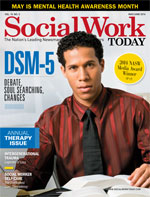|
Controversy of ‘Biblical’ Proportions Both those inside and outside of mental health services have loosely referred to the Diagnostic and Statistical Manual of Mental Disorders (DSM) as the bible of psychiatry. However, it’s not a bible but rather an imperfect reference tool to give professionals some organizational structure for coding diagnoses required for insurance company reimbursement. There’s no shortage of critics of the DSM-5. In a May 20, 2013, article appearing in The New York Times shortly after the new manual was released, Thomas R. Insel, MD, director of the National Institutes of Mental Health, was noted as criticizing the revised manual for defining mental disorders based on symptoms rather than underlying biological causes. Author Richard Friedman, MD’s response was that “in the meantime, the millions of Americans with mental illness need treatment now. They and their psychiatrists don’t have the luxury of waiting for definitive scientific knowledge ... with all its limitations, the DSM at least gives clinicians a common language to describe and treat mental disorders.” Clearly, the manual has many critics for various reasons. However, the topic of this month’s cover story doesn’t concern whether the manual is based on neurobiology but how some social workers see the manual as conflicting with social work’s strengths-based and ecological perspective. Although the DSM-5 differs in numerous ways from its predecessor, it still reflects a disease-based, pathology-driven worldview often at odds with the social work perspective. According to an article source, only one of the more than 100 members of the DSM-5 Task Force and workgroups had any formal social work education. Furthermore, Mirean Coleman, MSW, LICSW, CT, senior practice associate at NASW, says the organization’s attempts to participate were unsuccessful. Social workers are the largest group of mental health providers in the United States, so the issue of social work’s exclusion from participation in the DSM revision process is a formidable one for the task force and workgroups as well as the profession itself to wrestle with. Finally, we are honored to have been selected as the 2014 winner in the Best Trade Publication category by the NASW Media Awards. Many thanks to those who voted for Social Work Today and who continue to be our loyal readers and contributors.
|

 May/June 2014 Issue
May/June 2014 Issue